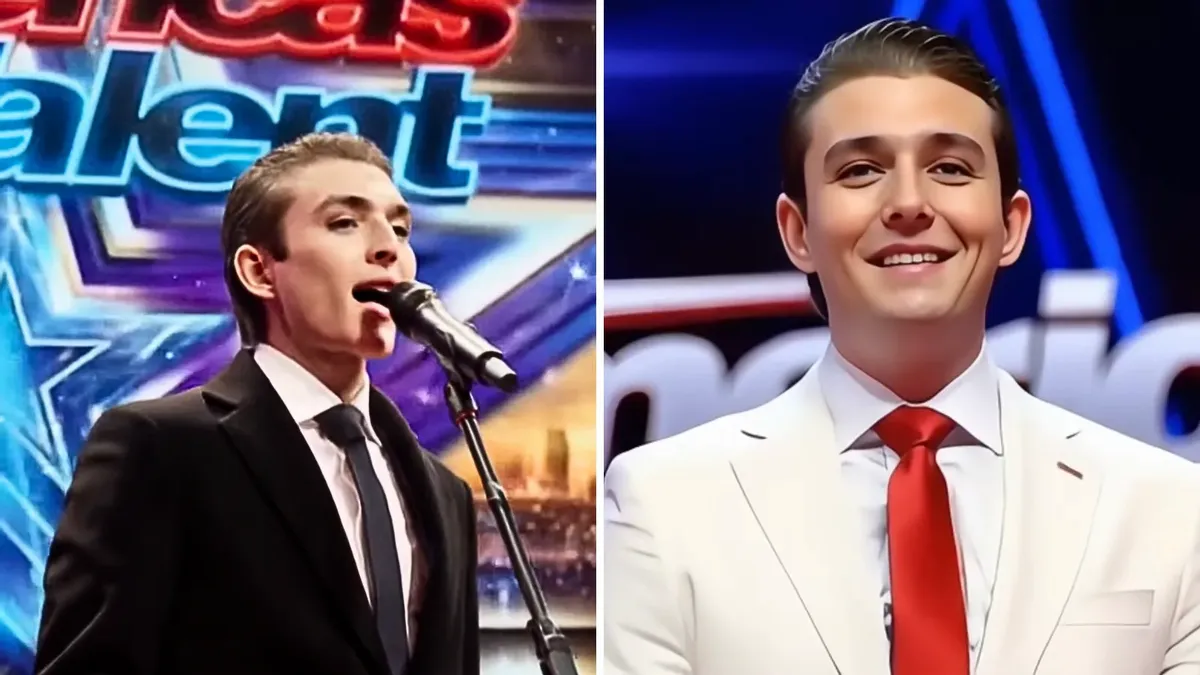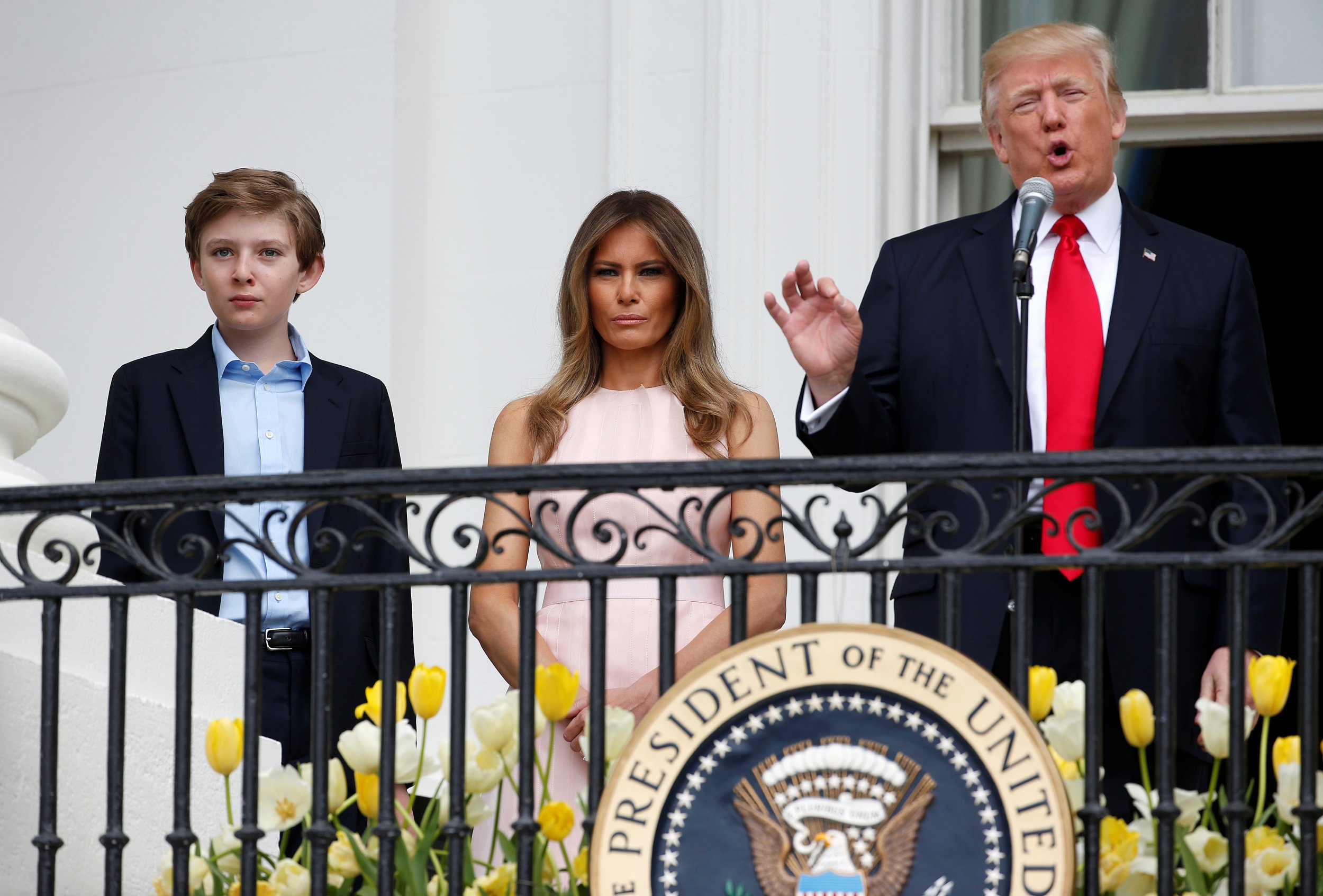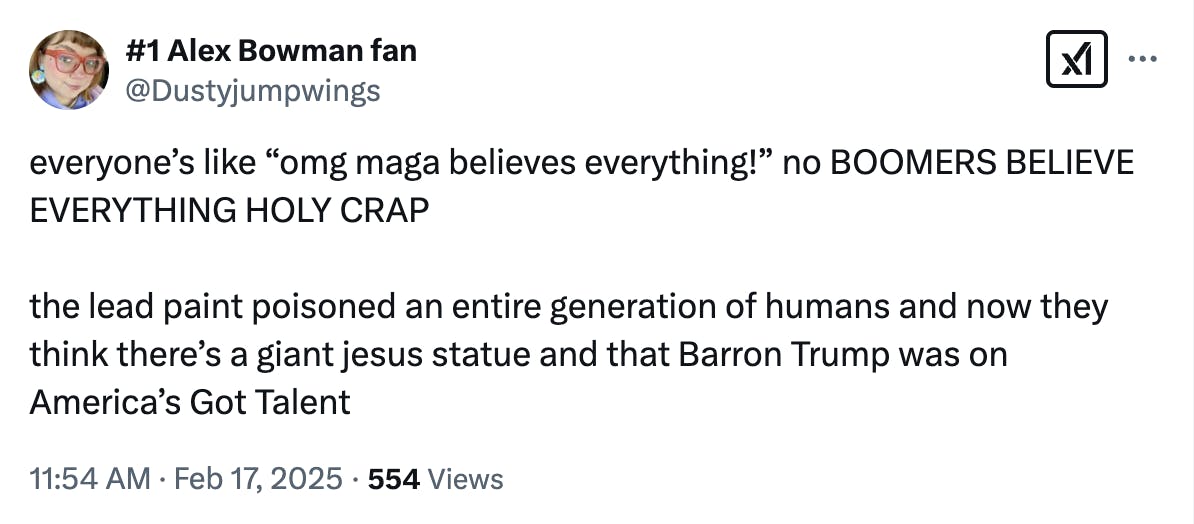Has Barron Trump, the typically private son of the former president, secretly been belting out tunes on national television? The internet is ablaze with speculation about whether Barron Trump graced the stage of America's Got Talent (AGT) with a surprise singing performance, but the truth is far more nuanced, and frankly, more technologically fascinating, than a simple 'yes' or 'no.'
The rumor mill started churning when snippets of videos began circulating online, seemingly depicting Barron Trump wowing audiences with his vocal prowess on AGT. These clips, shared across platforms like TikTok and YouTube, quickly garnered attention, particularly among older demographics. Captions promised a star-making turn, showcasing a hidden talent previously unknown to the public. However, a closer examination reveals a more intricate story involving artificial intelligence and the ever-blurring lines of reality online.
| Category | Fact | AI-Generated Fiction |
|---|---|---|
| Full Name | Barron William Trump | Subject of AI-generated videos depicting him as a singer. |
| Date of Birth | March 20, 2006 | N/A |
| Parents | Donald Trump & Melania Trump | N/A |
| Known For | Being the youngest son of Donald Trump and his relatively private upbringing. | AI-generated videos of him "singing" on America's Got Talent. |
| Singing Career | None | Fictional, created through AI technology. |
| AGT Appearance | Never appeared on America's Got Talent. | The basis of viral AI-generated content. |
| Authenticity of Videos | N/A | Fake, created using AI to mimic his likeness and voice. |
| Source of Confusion | N/A | The deceptive realism of AI technology fooling some viewers. |
| Impact of AI Videos | N/A | Highlights the growing challenge of distinguishing between real and fake content online. |
| Reference: The White House Official Website (for factual biographical information about the Trump family) |
One particularly viral video, posted on YouTube by a channel named Vivo Tunes on February 4, 2025, was titled "Barron Trump Singing in America's Got Talent | AI Cover." Crucially, the video's description explicitly stated that it was an AI-generated creation and that it should not be interpreted as reflective of Barron Trump's actual thoughts, feelings, or artistic endeavors. This disclaimer, however, was seemingly missed or ignored by a significant portion of viewers, leading to widespread confusion and the propagation of the false narrative.
The speed and ease with which these AI-generated videos spread highlight a growing problem in the digital age: the increasing difficulty in discerning fact from fiction. While some viewers were quick to recognize the telltale signs of AI manipulation – subtle distortions in the video, unnatural vocal inflections, and inconsistencies in background details – others were completely taken in by the illusion. Comments sections on these videos were filled with messages praising Barron Trump's supposed talent, expressing surprise at his hidden abilities, and even speculating about his future career in the music industry.
The "Barron Trump singing" phenomenon underscores the power of AI to create convincing deepfakes and the potential for such technology to be used for both harmless entertainment and malicious disinformation. The video posted by Vivo Tunes, while explicitly labeled as an AI creation, serves as a prime example of how easily misinformation can spread, even when disclaimers are present. The seductive allure of a "hidden talent" narrative, combined with the visual plausibility of AI-generated content, proved to be a potent combination, captivating the attention of millions and blurring the lines of reality.
The YouTube channel "Barron Trump Fan Clubs" also contributed to the buzz, further amplifying the reach of these AI-generated clips. While the intent of these fan channels may have been benign, their uncritical sharing of the videos helped to solidify the perception that Barron Trump had indeed appeared on America's Got Talent. The echo chamber effect of social media, where users are primarily exposed to information that confirms their existing beliefs, likely played a significant role in the spread of this misinformation. Those who were already inclined to believe that Barron Trump might possess a hidden talent were more likely to accept the videos as authentic, regardless of the disclaimers or subtle inconsistencies.
TikTok, with its emphasis on short-form video content, proved to be another fertile ground for the dissemination of the "Barron Trump singing" myth. A TikTok video posted by a user named Vidai (@johntitor75100) posed the question, "Curious if Barron Trump appeared on America's Got Talent?" The video, which garnered over 700 likes and numerous comments, promised to "discover the truth behind his rumored performances and insights!" While the video may have intended to debunk the rumor, its very existence served to further fuel the speculation and keep the narrative alive.
Newsweek also addressed the viral phenomenon in an article titled "Barron Trump Singing Videos Take Off Online." The article likely explored the origins of the videos, their cultural impact, and the reasons why they resonated with so many viewers. Such articles play a crucial role in debunking misinformation and providing the public with accurate information. However, even with the best efforts of reputable news organizations, the spread of false information online can be difficult to contain, particularly when it taps into pre-existing biases and emotional desires.
The popularity of these AI-generated videos raises important questions about the future of online content and the challenges of verifying information in the digital age. As AI technology continues to advance, it will become increasingly difficult to distinguish between real and fake videos. This poses a significant threat to the truth and could have serious consequences for everything from political discourse to personal reputations. It is therefore crucial that individuals develop critical thinking skills and learn to evaluate online content with a discerning eye. Media literacy education is more important than ever in helping people to navigate the complex and often deceptive landscape of the internet.
The case of the "Barron Trump singing" videos also highlights the ethical considerations surrounding the use of AI to create content that mimics real people. While some may view these videos as harmless entertainment, others argue that they represent a violation of privacy and a form of identity theft. The creation of deepfakes without the consent of the person being imitated raises serious legal and ethical questions that need to be addressed. The law has yet to catch up with the rapid advancements in AI technology, and it is important that policymakers begin to grapple with these issues before they become even more pervasive.
Furthermore, the response to these videos reveals a broader societal trend of seeking out and embracing narratives that confirm pre-existing beliefs and biases. In an increasingly polarized world, people are more likely to accept information that aligns with their political or social views, even if that information is demonstrably false. This phenomenon, known as confirmation bias, contributes to the spread of misinformation and makes it more difficult to engage in constructive dialogue. Overcoming confirmation bias requires a willingness to challenge one's own assumptions and to consider alternative perspectives, even when they are uncomfortable or challenging.
The viral success of the "Barron Trump singing" videos also speaks to the enduring fascination with celebrity culture and the public's desire for behind-the-scenes glimpses into the lives of famous people. Barron Trump, as the youngest son of a former president, has always been a figure of intrigue, largely shielded from the public eye. The idea that he might possess a hidden talent and be on the verge of a star-making turn is inherently appealing to many, tapping into a desire for novelty and surprise.
Ultimately, the "Barron Trump singing" saga serves as a cautionary tale about the power of AI, the challenges of verifying information online, and the importance of critical thinking in the digital age. While the videos themselves may be harmless entertainment, they underscore the potential for AI to be used to create deceptive content and the need for greater media literacy among the public. As AI technology continues to evolve, it is essential that individuals develop the skills and awareness necessary to navigate the complex and often treacherous landscape of the internet.
The internet is a vast and ever-changing landscape, and it is becoming increasingly difficult to distinguish between what is real and what is not. The "Barron Trump singing" videos are just one example of the many ways in which AI technology is being used to create convincing deepfakes and spread misinformation. It is therefore crucial that individuals remain vigilant and skeptical when consuming online content and that they develop the critical thinking skills necessary to evaluate information with a discerning eye.
In conclusion, while the idea of Barron Trump belting out tunes on America's Got Talent is an enticing one, the reality is that these viral videos are simply the product of sophisticated AI technology. The incident serves as a valuable reminder of the challenges we face in the digital age, where the lines between fact and fiction are increasingly blurred, and the importance of critical thinking and media literacy cannot be overstated. So, while you won't be adding Barron Trump to your playlist anytime soon, you can certainly add this experience to your growing awareness of the complexities of the online world.
Despite the clear lack of evidence, and the presence of AI disclaimers, some viewers desperately wanted to believe. This highlights a deeper societal issue – the desire to believe in narratives, regardless of their veracity, particularly when those narratives are entertaining or align with pre-existing beliefs. The "Barron Trump singing" phenomenon, therefore, isn't just about AI; it's about our own susceptibility to suggestion and the power of a good story, even when that story is demonstrably false.
Many were left wondering, "Does Barron Trump really sing?" or, "Why do people think Barron Trump sang on America's Got Talent?" The answer lies not in a hidden talent, but in the sophisticated algorithms that can now mimic voices and appearances with startling accuracy. The name "Barron Trump" became synonymous with this confusion, a case study in how quickly a fabricated narrative can take hold in the digital age.
The search queries "We did not find results for: Did barron trump sing on agt the ai videos explained," and "Check spelling or type a new query," became common as people tried to verify the claims. This further demonstrates the disconnect between the fabricated reality presented in the videos and the actual truth. The search engines, unable to find legitimate sources confirming the performance, simply reiterated the lack of evidence.
The phrase "Uncovering the mystery behind the name" became apt, as the investigation into the videos revealed not a singing sensation, but a technological illusion. The narrative surrounding Barron Trump's supposed AGT appearance is a powerful example of how easily AI can be used to manipulate public perception and underscores the urgent need for increased media literacy and critical thinking skills in the digital age.
The spread of these AI-generated videos highlights a growing concern about the potential for misuse of this technology. While in this case, the videos may have been intended as a harmless prank, the same technology could be used to create far more damaging deepfakes, spreading misinformation, and harming reputations. It is crucial that we develop strategies to combat the spread of AI-generated misinformation and hold those who create and disseminate it accountable.
Furthermore, the "Barron Trump singing" incident raises important questions about the ethics of creating AI-generated content that mimics real people without their consent. While parodies and satire are protected under free speech laws, the creation of deepfakes that could damage a person's reputation or career raises serious ethical concerns. It is important that we establish clear guidelines and regulations for the use of AI in content creation to protect individuals from harm.
The incident also serves as a reminder of the importance of verifying information before sharing it online. In the age of social media, it is all too easy to spread misinformation with the click of a button. Before sharing a video or article, take a moment to consider its source and whether the information it presents is credible. Consult multiple sources and be wary of content that seems too good to be true. By taking these simple steps, you can help to prevent the spread of misinformation and promote a more informed and accurate online environment.
The "Barron Trump singing" phenomenon is a microcosm of the larger challenges we face in the digital age. As technology continues to advance, it will become increasingly difficult to distinguish between what is real and what is fake. It is therefore essential that we develop the skills and awareness necessary to navigate this complex and ever-changing landscape. By promoting media literacy, critical thinking, and ethical use of AI, we can create a more informed and resilient society.
So, the next time you see a video claiming to show Barron Trump singing on America's Got Talent, remember this story. Remember the AI, the disclaimers, and the easily swayed viewers. And most importantly, remember to always question what you see online, because in the age of deepfakes, believing is no longer seeing – seeing is believing, with a healthy dose of skepticism.
The fact that a simple AI-generated video could generate so much buzz proves how easily manipulated our perceptions can be. Perhaps, instead of focusing on the supposed singing talents of Barron Trump, we should be focusing on the technological advancements that made this deception possible, and the critical thinking skills we need to arm ourselves with to navigate the digital landscape.
In the end, the "Barron Trump singing" saga is not about Barron Trump at all. It is a reflection of ourselves, our biases, our desires, and our vulnerability to the persuasive power of technology. It's a wake-up call, urging us to be more critical, more informed, and more discerning consumers of information in the digital age. The mystery has been uncovered, the truth has been revealed, and the lesson has been learned: believe nothing you hear, and only half of what you see, especially on the internet.
And as for Barron Trump? He remains, as always, an enigma, shielded from the public spotlight, leaving us to wonder what hidden talents he truly possesses, and whether he'll ever choose to share them with the world. But one thing is certain: he's probably not auditioning for America's Got Talent anytime soon.
The "videos of barron trump wowing crowds with country music and a thick southern drawl may be fake, but the good news for those who want to dance along to the president's son is that his actual," what? The statement is cut off, and perhaps that's the point. The real Barron Trump remains an unknown quantity, while the AI-generated version continues to capture the imagination of the internet.
Ultimately, the "Barron Trump singing" incident is a reminder that in the digital age, seeing is not necessarily believing. It's a call to arms for critical thinking, media literacy, and a healthy dose of skepticism. So, the next time you see something online that seems too good to be true, remember the story of Barron Trump and the AI-generated singing videos. And ask yourself: is this real, or is it just another digital illusion?
The youngest son of former pres(ident) remains an enigma, his life largely shielded from the public eye. This air of mystery only fuels the speculation and intrigue surrounding him, making him a prime target for AI-generated content. The question now is, how do we protect individuals from the potential harm of these deepfakes and ensure that the truth prevails in the digital age?
Explore its origins, cultural impact, and why it matters. The "Barron Trump singing" phenomenon is more than just a viral trend; it's a reflection of our digital society and the challenges we face in navigating the ever-evolving landscape of online information. By understanding its origins and cultural impact, we can better equip ourselves to discern fact from fiction and promote a more informed and accurate online environment.


